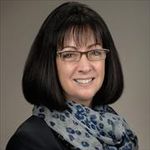Infectious Disease Research Symposium Highlights Accomplishments, Challenges
As one of the events marking the 175th anniversary of its founding, the Chobanian & Avedisian School of Medicine sponsored an Infectious Disease Research Panel symposium on April 4 that highlighted the important role of the National Emerging Infectious Diseases Laboratories (NEIDL). Approximately 100 people tuned in to the online forum.
 “Our mission here is to do cutting-edge research that’s going to help us combat infectious disease and create cures,” said symposium moderator and NEIDL Director Nancy Sullivan, ScD. “It’s this basic research that leads to our ability to develop vaccines and drugs.”
“Our mission here is to do cutting-edge research that’s going to help us combat infectious disease and create cures,” said symposium moderator and NEIDL Director Nancy Sullivan, ScD. “It’s this basic research that leads to our ability to develop vaccines and drugs.”
Sullivan said that, globally, infectious diseases are on the rise in every country that tracks them.
“The problem is, just like with SARS CoV-2, we don’t know what’s going to emerge next,” said Sullivan. “This is why we have this facility.”
The event featured presentations on work being done by researchers Florian Douam, PhD, assistant professor of microbiology; Rachel Fearns, PhD, professor of microbiology; Mohsan Saeed, PhD, assistant professor of biochemistry; and Elke Mühlberger, PhD, professor of microbiology and director of the NEIDL’s Integrated Science Core, followed by a robust Q&A session.
Sullivan said that with so many viruses, and limited research capacity and money, pandemic preparedness lies in developing broad spectrum vaccines and medications.
“Call them countermeasures…Something that we can say works either on a family of viruses or on viruses that use similar pathways to replicate in cells,” she said. “The only way you can design those is if you know how these viruses are replicating, how they’re causing pathogenicity, and the kinds of immune responses needed to block them. Our team of researchers is doing this important work.”
To view the event, click here.
View all posts